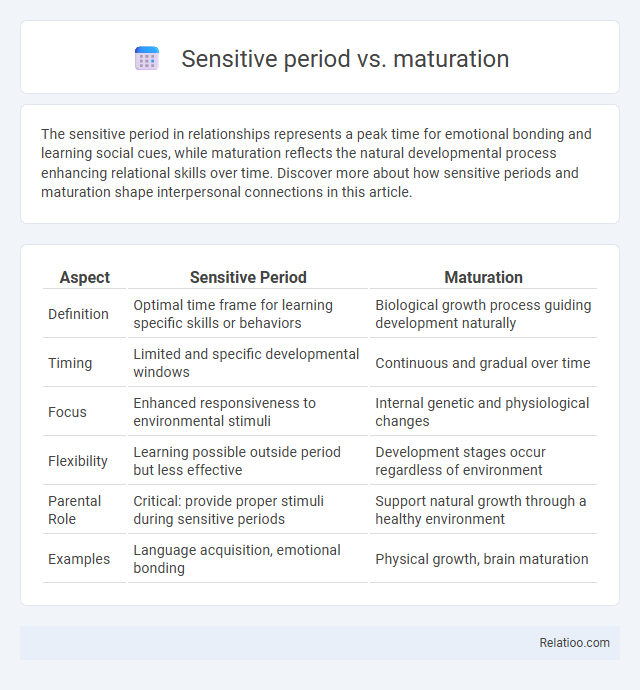The sensitive period in relationships represents a peak time for emotional bonding and learning social cues, while maturation reflects the natural developmental process enhancing relational skills over time. Discover more about how sensitive periods and maturation shape interpersonal connections in this article.
Table of Comparison
| Aspect | Sensitive Period | Maturation |
|---|---|---|
| Definition | Optimal time frame for learning specific skills or behaviors | Biological growth process guiding development naturally |
| Timing | Limited and specific developmental windows | Continuous and gradual over time |
| Focus | Enhanced responsiveness to environmental stimuli | Internal genetic and physiological changes |
| Flexibility | Learning possible outside period but less effective | Development stages occur regardless of environment |
| Parental Role | Critical: provide proper stimuli during sensitive periods | Support natural growth through a healthy environment |
| Examples | Language acquisition, emotional bonding | Physical growth, brain maturation |
Understanding Sensitive Periods in Development
Sensitive periods in development represent optimal windows when your brain is particularly receptive to specific types of learning, contrasting with maturation, which refers to the natural, genetically driven growth process unfolding over time. Unlike maturation, sensitive periods emphasize environmental influences that significantly impact skill acquisition and neurological development. Understanding these critical phases allows you to optimize educational and developmental interventions for enhanced cognitive and emotional growth.
Defining Maturation: An Overview
Maturation refers to the natural biological growth processes that enable the development of skills and functions in a predetermined sequence, independent of environmental influences. Unlike sensitive periods, which are optimal windows for acquiring specific behaviors or functions, maturation emphasizes the inherent timing of developmental milestones driven by genetic factors. Understanding maturation provides insight into the gradual unfolding of physical, cognitive, and emotional capabilities essential for normal human development.
Key Differences Between Sensitive Periods and Maturation
Sensitive periods refer to specific windows in early development when the brain is particularly receptive to certain stimuli, enabling rapid learning and skill acquisition. Maturation involves the biological unfolding of an individual's genetic blueprint, leading to the natural progression of physical and cognitive abilities over time regardless of experience. The key difference lies in sensitive periods being experience-dependent phases that optimize development, whereas maturation is experience-independent, driven primarily by genetic and physiological processes.
Biological Basis of Sensitive Periods
The biological basis of sensitive periods centers on heightened neuroplasticity during specific developmental windows when the brain is particularly receptive to environmental stimuli, facilitating optimal learning and adaptation. Maturation involves the genetic and physiological growth processes that prepare the brain and body for new abilities, but sensitive periods denote times when external experiences profoundly influence developmental outcomes. Understanding these concepts helps you target interventions that align with the brain's natural timing for maximum developmental impact.
The Role of Genetics in Maturation
Genetics plays a crucial role in maturation by regulating the biological timing and sequence of developmental milestones through inherited genetic codes. While sensitive periods refer to specific windows where environmental stimuli have a heightened impact on learning and development, maturation represents the genetically programmed unfolding of growth processes. Your understanding of development deepens by recognizing that genetics drives maturation, setting the stage for sensitive periods to optimize skill acquisition and behavioral changes.
Environmental Influences on Sensitive Periods
Sensitive periods represent optimal windows in development when environmental influences have heightened impact on neural plasticity and behavioral outcomes. Maturation refers to the internally driven biological growth processes that shape development independently of specific environmental inputs, contrasting with sensitive periods which depend on external stimuli for optimal progression. Environmental influences during sensitive periods critically shape cognitive, emotional, and social development by modulating gene expression, synaptic connectivity, and neurochemical pathways, underscoring the interplay between genetics and experience.
Critical Examples: Language Acquisition vs Physical Growth
Sensitive periods and critical periods are crucial phases in development where Your brain is especially receptive to certain stimuli, but they differ in flexibility and timing. Language acquisition exemplifies a sensitive period, allowing for gradual learning with some plasticity beyond early childhood, whereas physical growth illustrates maturation, governed by genetic programming and less dependent on external input. Understanding these distinctions helps optimize interventions and support during Your child's developmental milestones.
Implications for Early Childhood Education
Sensitive periods in early childhood denote optimal windows when Your child's brain is highly receptive to specific types of learning, while maturation refers to the natural, genetically programmed growth that underlies developmental readiness. Understanding these concepts helps educators tailor curriculum timing and interaction methods to align with children's developmental stages, maximizing learning efficiency and emotional growth. Implementing practices that respect sensitive periods fosters a supportive environment for cognitive, language, and social skills acquisition during critical phases of early childhood education.
Challenges in Distinguishing Sensitive Periods from Maturation
Distinguishing sensitive periods from maturation poses challenges due to overlapping developmental timelines and the gradual nature of neural changes, making it difficult to isolate critical windows specific to environmental influences. Sensitive periods represent timeframes when experience profoundly shapes neural circuits, whereas maturation involves intrinsic biological processes unfolding regardless of external stimuli. Researchers face obstacles in experimentally separating these effects, as variations in experience can accelerate or delay maturation, blurring the boundaries between sensitive period plasticity and genetically driven developmental progression.
Future Research Directions in Developmental Science
Future research in developmental science should focus on distinguishing the nuanced interplay between sensitive periods and maturation processes, emphasizing how environmental factors might extend or modify these windows of heightened plasticity. Investigating the biological mechanisms underlying sensitive periods can provide insights into optimizing timing for interventions that align with your child's developmental trajectory. Advancements in neuroimaging and longitudinal studies will be pivotal for clarifying how maturation constrains or facilitates these sensitive periods, ultimately informing personalized approaches to developmental support.

Infographic: Sensitive period vs Maturation
 relatioo.com
relatioo.com